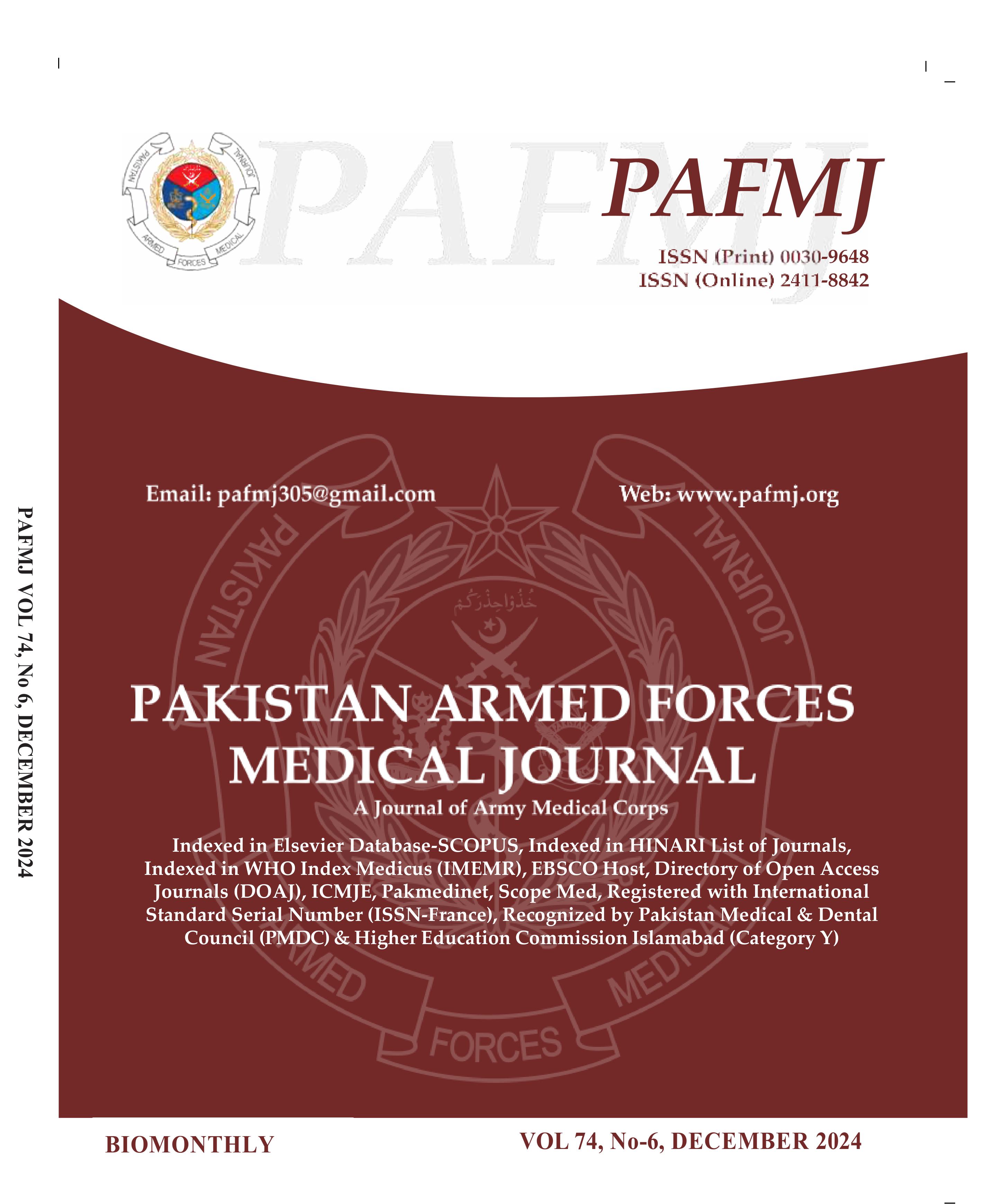Role of Intense Pulse Light Therapy on Dry Eyes in Pakistani Population
DOI:
https://doi.org/10.51253/pafmj.v74i6.9958Keywords:
Dry Eyes, Intense Pulse Light Therapy, Meibomian Gland Dysfunction.Abstract
Objective: To observe the role of Intense Pulse Light therapy on dry eyes in Pakistani population.
Study Design: Analytical cross-sectional study.
Place and Duration of Study: Armed Forces Institute of Ophthalmology, Rawalpindi Pakistan, from Feb to Dec 2022.
Methodology: A total of 88 patients with meibomian gland related dry eyes were included in this study, with age ranging between 25-65 years. Intense pulsed light therapy was used to treat Meibomian Gland Dysfunction related dry eyes. Tear film break up time before and after the sessions was recorded on a data collection tool and data analysis was done.
Results: Out of 88 patients with Meibomian Gland Dysfunction related dry eyes, 60(68.2%) were females and 28(31.8%) were males. Mean age of the patients was 45.5±8.0 years and median tear film break up time (per Intense Pulse Light) was 4(5–3) seconds, whereas median tear film break-up time (post Intense Pulse Light) was increased to 12(13–11) seconds. Follow up was done until 4 months, which showed significant improvement in symptoms of patients. Tear Breakup Time did not improve in 2 patients as they were already on anti-glaucoma treatment (p-value <0.01).
Conclusion: Intense Pulse Light was found to be the safest way of treating Meibomian Gland Dysfunction-related dry eyes which showed significant improvement in patient symptoms.
Downloads
References
Shi Y, Wu Y. Efficacy and safety of intense pulsed light therapy for dry eye caused by meibomian gland dysfunction: a randomised trial. Ann Palliat Med 2021; 10(7): 7857-7865.
https://doi.org/10.21037/apm-21-1303
Cote S, Zhang AC, Ahmadzai V, Maleken A, Li C, Oppedisano J, et al. Intense pulsed light (IPL) therapy for the treatment of meibomian gland dysfunction. Cochrane Database Syst Rev 2020; 3(3): CD013559.
https://doi.org/10.1002/14651858.CD013559
Xue AL, Wang MTM, Ormonde SE, Craig JP. Randomised double-masked placebo-controlled trial of the cumulative treatment efficacy profile of intense pulsed light therapy for meibomian gland dysfunction. Ocul Surf 2020; 18(2): 286-297.
https://doi.org/10.1016/j.jtos.2020.01.003
Egri S, Van Hollebecke I, Guindolet D, Manenti C, Rougier H, Gabison É, et al. Efficacy of intense pulsed light therapy in the treatment of meibomian gland dysfunction-related severe dry eye. J Fr Ophtalmol 2021; 44(2): 169-175.
https://doi.org/10.1016/j.jfo.2020.04.061
Vergés C, Salgado-Borges J, Ribot FM. Prospective evaluation of a new intense pulsed light, Thermaeye Plus, in the treatment of dry eye disease due to meibomian gland dysfunction. J Optom 2021; 14(2): 103-113.
https://doi.org/10.1016/j.optom.2020.08.009
Leng X, Shi M, Liu X, Cui J, Sun H, Lu X. Intense pulsed light for meibomian gland dysfunction: a systematic review and meta-analysis. Graefes Arch Clin Exp Ophthalmol 2021; 259(1): 1-10.
https://doi.org/10.1007/s00417-020-04834-1
Dell SJ. Intense pulsed light for evaporative dry eye disease. Clin Ophthalmol 2017; 11: 1167-1173.
Miao S, Yan R, Jia Y, Pan Z. Effect of intense pulsed light therapy in dry eye disease caused by meibomian gland dysfunction: a systematic review and meta-analysis. Eye Contact Lens 2022; 48(10): 424-429.
https://doi.org/10.1097/ICL.0000000000000934
Arita R, Fukuoka S. Non-pharmaceutical treatment options for meibomian gland dysfunction. Clin Exp Optom 2020; 103(6): 742-755. https://doi.org/10.1111/cxo.13035
Zheng Q, Xue Y, Zhong X, Li G, Shi W, Wang T. Correlation study between abnormal morphology of meibomian glands and meibum in patients with dry eye disease under in vivo confocal microscopy. Front Med (Lausanne) 2022; 8: 793338.
https://doi.org/10.3389/fmed.2021.793338
Fukuoka S, Arita R. Comparison of intense pulsed light therapy on patients with meibomian gland dysfunction using AQUA CEL and M22 devices. J Clin Med 2022; 11(15): 4265.
https://doi.org/10.3390/jcm11154265
Toyos R, McGill W, Briscoe D. Intense pulsed light treatment for dry eye disease due to meibomian gland dysfunction; a 3-year retrospective study. Photomed Laser Surg 2015; 33: 41-46.
https://doi.org/10.1089/pho.2014.3819
Rong B, Tang Y, Tu P, Liu R, Qiao J, Song W, et al. Intense pulsed light applied directly on eyelids combined with meibomian gland expression to treat meibomian gland dysfunction. Photomed Laser Surg 2018; 36: 326-332.
https://doi.org/10.1089/pho.2017.4402
Toyos R, Toyos M, Willcox J, Mulliniks H, Hoover J. Evaluation of the safety and efficacy of intense pulsed light treatment with meibomian gland expression of the upper eyelids for dry eye disease. Photobiomodul Photomed Laser Surg 2019; 37: 527-531.
https://doi.org/10.1089/photob.2018.4599
Arita R, Fukuoka S, Morishige N. Therapeutic efficacy of intense pulsed light in patients with refractory meibomian gland dysfunction. Ocul Surf 2018; 17: 104-110.
https://doi.org/10.1016/j.jtos.2018.11.004
Liu R, Rong B, Tu P, Tang Y, Song W, Toyos R, et al. Analysis of cytokine levels in tears and clinical correlations after intense pulsed light treating meibomian gland dysfunction. Am J Ophthalmol 2017; 183: 81-90.
https://doi.org/10.1016/j.ajo.2017.08.021
Rong B, Tang Y, Liu R, Tu P, Qiao J, Song W, et al. Long-term effects of intense pulsed light combined with meibomian gland expression in the treatment of meibomian gland dysfunction. Photomed Laser Surg 2018; 36: 562-567.
https://doi.org/10.1089/pho.2018.4499
Xue AL, Wang MTM, Ormonde SE, Craig JP. Randomised double-masked placebo-controlled trial of the cumulative treatment efficacy profile of intense pulsed light therapy for meibomian gland dysfunction. Ocul Surf 2020; 18: 286-297.
https://doi.org/10.1016/j.jtos.2020.01.003
Piyacomn Y, Kasetsuwan N, Reinprayoon U, Satitpitakul V, Tesapirat L. Efficacy and safety of intense pulsed light in patients with meibomian gland dysfunction—a randomized, double-masked, sham-controlled clinical trial. Cornea 2019; 39: 325-332.
https://doi.org/10.1097/ICO.0000000000002204
Tashbayev B, Yazdani M, Arita R, Fineide F, Utheim TP. Intense pulsed light treatment in meibomian gland dysfunction: a concise review. Ocul Surf 2020; 18: 583-594.
https://doi.org/10.1016/j.jtos.2020.06.002
Marta A, Baptista PM, Heitor Marques J, Almeida D, José D, Sousa P, et al. Intense pulsed plus low-level light therapy in meibomian gland dysfunction. Clin Ophthalmol 2021; 15: 2803-2811. https://doi.org/10.2147/OPTH.S318885
Downloads
Published
Issue
Section
License
Copyright (c) 2024 Murtaza Sameen, Muhammad Shahid, Muhammad Adnan, Abdul Rauf, Jawwad Ahmad, Khalid Naimat

This work is licensed under a Creative Commons Attribution-NonCommercial 4.0 International License.















